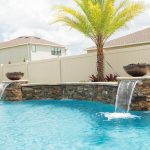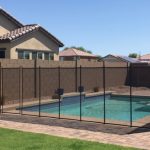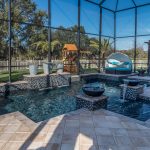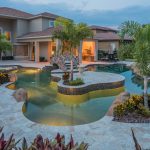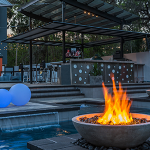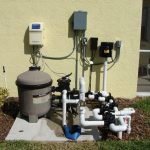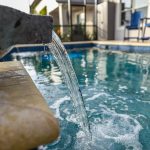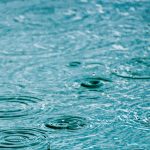Over the winter months, you may notice your pool’s water level going down which makes you wonder “How much evaporation is normal?” Knowing this information will help you figure out if the decreasing level of your pool water is due to evaporation or a possible leak. Don’t fret! A swimming pool without heaters or water features can lose approximately a quarter inch of water every day. That means your pool can lose over 1.5″ in a week. Most pools won’t lose quite so much, but it’s a good, general measurement to keep in mind. Causes of Pool Evaporation There are many things that can affect water evaporation in Central Florida, but the three main factors are: temperature, humidity levels and exposure. Temperature: During the cooler months, Central Florida sees quite the drastic swings in temperatures throughout the day. The warm temperatures during the day heat your pool up, then the cooler temperatures at night cause the water to evaporate. This happens throughout the evening, until the sun comes out to warm the pool water again. Humidity: When humidity levels are high, evaporation is low. Vice versa, when humidity is low, evaporation is high. Think of the air as a sponge. When a sponge is dry, it can hold more water. The dryer the air, the more evaporation you will see. Exposure: Evaporation also increases if your pool is exposed to wind and the sun. Sometimes all year round in Florida the intense sunlight will lead to evaporation. The chemicals added Read the full article…
The temperature is wavering between chilly and warm here in Central Florida, but for most of us, pool season has come to an end. It is true that more accidents happen around the pool in the summer months, but serious accidents can and do happen during the off season. Since swimming isn’t on your mind, it is easy to become less aware of the pool than usual; however, accidental submersion is still a serious risk during the colder months. Pool safety is still an absolute must even if no one is actively using the pool. It is our mission at Pools by Bradley for everyone to enjoy their pool to its fullest, but most importantly, that it is enjoyed SAFELY for years to come. Pool Safety Tips for the Winter It is required by Florida law that all new pool construction must meet at least one of the following requirements relating to pool safety features: (a) the pool must be isolated from access to a home by an enclosure that meets the pool barrier requirements; (b) the pool must be equipped with an approved safety pool cover; (c) all doors and windows providing direct access from the home to the pool must be equipped with an exit alarm that has a minimum sound pressure rating of 85 dB A at 10 feet; or (d) all doors providing direct access from the home to the pool must be equipped with a self-closing, self-latching device with a release mechanism placed no lower than Read the full article…
You may have been thinking about building your dream pool for quite some time now but have yet to pull the trigger. The good news is, with the cooler weather here in Central Florida, now is the time to build so you can be swimming come pool season. However, no matter when you decide to start building the pool of your dreams, before you dive-in there are some important things to consider. Here are 8 things you should think about while you’re finalizing your decision to build a pool. 8 Things to Consider Before Building a Pool 1. Look into your zoning laws. Before you break ground, we’ll need to make sure your property is following your city’s zoning ordinances for residential pools. These ordinances vary by city and some have more strict liability and maintenance laws than others. For instance, Orange County, Seminole County and Volusia County all have their own zoning ordinances. It can seem a bit confusing, but don’t worry, Pools by Bradley is here to help you! 2. What pool shape do you want? Concrete (gunite) pools provide almost unlimited customization options. It’s why we here at Pools by Bradley build pools with gunite. Because of this, we can design countless waterscapes that fit right into your individual yard and space. There are so many different pool shapes to choose from such as geometric, and Grecian, or we can create a custom shaped free-form pool that’s like no other. We’ll walk you through the options so Read the full article…
You’ve been staring at your backyard and envisioning how your dream pool would look. Your kids have been begging for a pool too! There’s a lot of thought and planning that goes into this decision, especially the investment. It’s easy to imagine you and your children having fun in your new family pool for years to come, but you also have to weigh in the return on investment. Does it make sense for you to financially to put in an inground pool? Will the benefits outweigh the investment? It’s a difficult decision to make when you want to follow your heart but have to listen to your head. So, which one should win? Honestly, neither should win. Your decision should be made with your head and your heart. The years of family and friends time spent in the pool is completely worth it AND installing a pool can also be an investment that can pay off in the end. It all depends upon how long you plan to stay in your home. If you’re in for the long-haul, then yes, it could pay off with an increased resale value. If you’re only going to be there for a few more months or live somewhere that’s only warm for two months out of the year, then no, a pool will most likely not add immediate value to your home. Here in Central Florida, we are lucky enough to able to swim almost year-round, so it may be worth it to build Read the full article…
The temperatures are finally getting cooler in Central Florida. This means pool temperatures are getting colder, leading to less swimming if no swimming at all. Instead of jumping in the pool to cool off, we’re thinking about bundling up and having the first fire of the season. That is, unless, you’re lucky enough to have a heated pool or the less common indoor pool. The good news is, even if your pool has been winterized for the season, there are still ways to get your pool fun fix in the winter months! Host a Winter Pool Party Even if the weather may make it too cold to swim, here in Florida we still have warmer climates than most. Fall and Winter are the best seasons to enjoy the outdoors without sweating! This means that the space around your pool is still a great area to gather with friends and family and host a party. You never know, someone may end up jumping in the pool anyway! You can also decorate the area around the pool for the different holidays or just make it seasonal. Lighting is a great way to make the area around your pool feel like the holidays have arrived. For Thanksgiving, hang fall colored garland and place pumpkins around your garden or landscape. Come Christmas, run some twinkling strands of lights around your pool area and watch the holiday spirit come alive. Trim the trees and bushes with lights and ornaments. Break out the hot cocoa (or Read the full article…
Imagine you’re sitting in your new backyard oasis, gazing at the beautiful, custom pool of your dreams. The breeze is blowing, the sun is shining and you’re relaxing with a cold drink. However, you look over to your right and there it is, the pool equipment. One thing you may have not considered when building your new pool is all the pool equipment that has to have a home in your backyard as well. Filters, heaters, pumps, plumbing, and PVC pipes are all necessary equipment for a pool to function properly, but you’d probably rather not have to look at them. So, what are the options for hiding these necessary, but not exactly attractive, pieces of equipment? Ideas for Hiding Pool Equipment Landscaping Bushes: The denseness of bushes make them a great option for hiding pool equipment. They are also able to grow thick and tall enough to create a pseudo wall, which also helps with filtering out noise! When selecting bushes for concealing equipment, make sure you choose ones that don’t grow too fast or drop a lot of debris. Stay away from any that flower or drop fruit – the berries can stain your deck and also attract insects. Trees: Here in Central Florida, palm plants are ideal. There are so many varieties available that are short and full, perfect for hiding pool equipment. Palms are generally low maintenance and you won’t have a problem with fronds shedding into your pool. Same with bushes, stay away from any Read the full article…
May was National Water Safety Month, and, even though it was 4 months ago, water safety is still an important topic. Learning to swim is an essential life skill that should be a priority for every member of your family. Knowing how to swim is a key factor in the prevention of drowning – especially in children. But when should you start your child(ren) in swim lessons? Here are the things you need to know to make an informed decision for your child(ren). What Age Should Swim Lessons Start? Every child develops at a different rate, so they won’t all be ready to start swimming at the same time. It’s important for parents to determine when their child is ready to learn to swim based off of many factors: exposure to bodies of water, curiosity about swimming pools and emotional/physical development. The AAP (American Academy of Pediatrics) recently decreased their recommended age for swim lessons from age 4 to age 1. Kids between the ages of 1 and 4 are at the highest risk for drowning, especially when they have access to bodies of water unexpectedly. The AAP recognizes swim lessons in such young children as an extra layer of protection against drowning and a way to introduce good water safety habits. What Will My Child Learn in Swim Lessons? When starting your child in swim lessons around the age of 1, the goal is to teach them how to get out of the water. Many times, if a child Read the full article…
There’s nothing better than jumping into your pool after a hot day, but many pool owners underestimate the amount of work involved in maintaining a pool. While pools can provide hours of relaxation and entertainment, the water’s chemistry is not to be taken lightly. It is always important to make sure your pool’s chemicals are balanced before anyone takes a dip. Pool chemistry is the ultimate balancing act. To maintain a pool properly, you must keep the water balanced with chemicals specifically for the pool and keep those chemicals at the correct levels. If Calcium Hardness levels are too high, or alkalinity or pH is too low, there could be problems – such as your water becoming corrosive or the formation of scale. Maintaining the proper calcium hardness, pH and alkalinity levels, prevents numerous problems, such as: Discolored or cloudy water Pool surface/equipment corrosion Algae formation Formation of stains and scale Pool Chemistry & Water Balancing Chemicals Maintaining your pool chemistry correctly is all about water balance and keeping elements out of your pool – such as oils and dirt. Although there are others, the most important levels to keep on top of are pH, total alkalinity and Calcium Hardness. But what are these and what do they mean? Here’s a brief explanation of each so you have a better understanding of the important role each one plays. pH pH is the measurement of the acidity or basicity of the water. The scale goes from 0 to 14, with 7 Read the full article…
Building a new pool is an exciting time! As you witness the pool construction process, you are able to see your dream pool come to life before your eyes. As we’ve discussed before, fall and winter are the ideal seasons for building a pool here in Central Florida; however, many homeowners wait until Spring and summer to make outdoor upgrades. While there is no BAD time to build a pool, spring and summer bring wetter weather with them, which can disrupt the pool construction process. In fact, the Weather Atlas reports that from May to mid-September, Orlando has the highest amount of precipitation all year round, averaging between 3.6″ and 7.3″. Even though the temperature may be warm and pleasant, bad weather makes a surprise visit almost daily. Knowing up front what happens when inclement weather delays the construction process can make the bad news easier to digest as you’ve set realistic expectations. What is often confusing and a bit frustrating for pool buyers is that delays may be longer than the inclement weather’s duration. Unfortunately, one day of rain does not equal a one-day delay. Here are some of the key reasons why. How Construction is Affected by Wet Weather Construction sites need to be dry – and that takes time From the beginning of the pool building process, a dry construction site is required. Heavy machinery is used, such as an excavator, and in order to drive over the ground without getting stuck in mud, the soil must Read the full article…
Hurricane Dorian has finally passed and, luckily, didn’t make landfall in Florida. While Central Florida was spared, many coastal communities still experienced strong hurricane and tropical storm force winds. With another tropical storm in Florida’s path, and hurricane season still in full force, this topic is still on our minds. We previously talked about how to prepare your pool for a hurricane, but what do you need to do for your pool after the storm passes? The chemistry of your pool and spa is greatly affected by the rain and debris that come with heavy storms. Here’s what you need to know to properly get your pool to back to swim-worthy after a storm. Post Storm Pool Clean-up 1. Skim Leaves and Debris The very first thing you should do after severe storm is remove any floating debris on the surface of the pool as well as any that has settled on the bottom. You’ll want to do this with your skimmer/leaf net on an extendable pole so you can rake and scoop up the leaves and debris from the surface and bottom of the pool. Concentrate on the larger debris at this point as any small dirt particles will be vacuumed up later in the process. The greatest concern with leaving debris in your pool after a heavy rainfall is the growth of algae. Rainstorms bring pollen and plant matter that encourage the growth and spread of algae. Algae growth in the pool water that is left untreated for Read the full article…
- 1
- 2
- 3
- 4
- Older Posts





